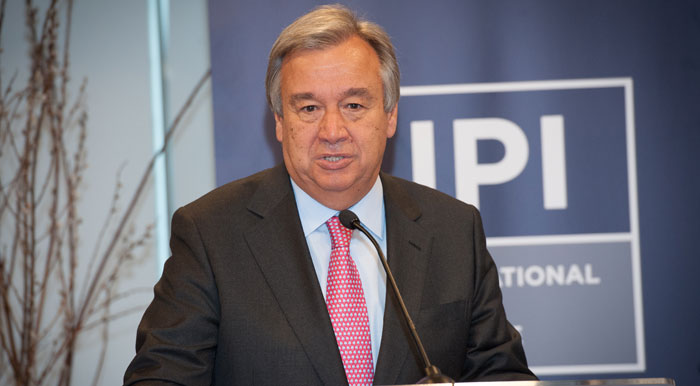
“We are witnessing the combination of two very worrying factors: crises are multiplying, old crises never seem to die,” António Guterres, the UN High Commissioner for Refugees, told an IPI audience on May 31, 2012. Mr. Guterres focused his discussion on the new UNHCR publication, launched earlier that day, The State of the World’s Refugees: In Search of Solidarity, which addresses key developments related to internal and cross-border displacement of people and the means by which to help states shoulder their responsibilities for the forcibly displaced.
Mr. Guterres said that the world today is neither unipolar nor multipolar. The uncertainty with this transition, he said, is making “conflicts pop up” that are “difficult to predict.” This situation is further complicated by the “enormous limitations in the international community both for the prevention of conflict and resolution of conflict,” he said.
“The number of new refugees that emerged last year was the highest in a decade. At the same time, we have more and more refugees in a protracted refugee situation,” he said. “Today more than 70 percent of refugees under the UNHCR mandate have been refugees for more than five years.”
He explained new trends in forced displacement that are not related to armed conflict. “We are seeing more and more people having to move for other reasons,” he said. The factors are what he termed the “interaction of global megatrends” such as “urbanization, population growth, food insecurity, water scarcity, climate change.”
In addition, humanitarian space is shrinking. “More and more…we have sometimes national armies, international forces, UN and others, we have rebel groups, we have ethnic militias, we have religious militias, and gangsters,” in crisis regions. “More and more areas are becoming totally lawless,” he said, which makes it difficult for humanitarian actors to deliver assistance. Further complicating matters is the blurring of the line between humanitarian and armed actors.
Mr. Guterres mentioned that the 1951 Refugee Convention only provides international legal protection to those fleeing conflict across international borders. As such, it becomes especially difficult if those who flee remain within their borders, where legally their governments are supposed to provide protection. Such protection is not always forthcoming, he said, because governments are often either unable, or in some cases unwilling, to help displaced populations.
On options to rehabilitate refugees, he said, “Resettlement is an instrument of solidarity, facilitates our work in guaranteeing that asylum space is maintained,” although the opportunities for resettlement today are far less than demand.
Other options such as “voluntary repatriation and local integration, are key from the point of view of solutions.” He cautioned however that, “voluntary repatriation and local integration in areas which are extremely poor are not possible without meaningful development programs associated.”
“There is never a humanitarian solution for these problems. The solution is always political,” he said, concluding that “solidarity is extremely important. There is no single, simple solution for these questions. They all now require, because of their complexity, the involvement of a number of actors.”
The event was moderated by Warren Hoge, IPI Senior Adviser for External Relations.
Interview with António Guterres, UN High Commissioner for Refugees
Watch event:







